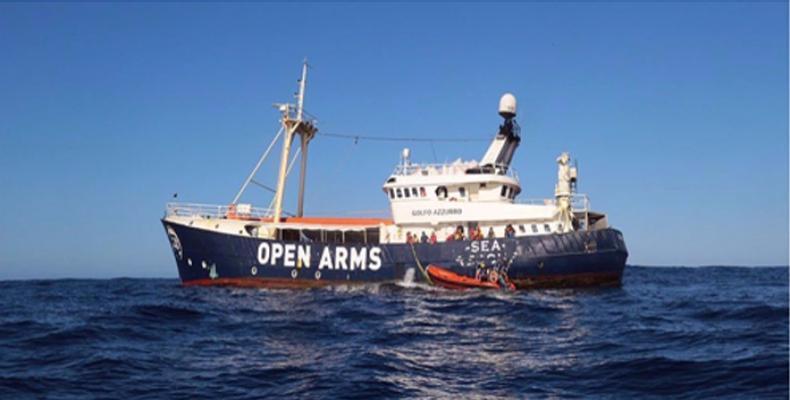Rome, August 7 (RHC)-- After spending six days at the Mediterranean sea, mostly waiting for Malta to allow the landing of 121 African shipwrecks, the rescue vessel Open Arms announced that it will enter Italian territorial waters if the humanitarian situation worsens on board.
"If the situation worsens, we will enter Italy," Oscar Camps, the founder of Proactiva, the NGO owning the ship, told Catalunya Radio on Wednesday morning. Almost immediately, Italy's far-right Interior Minister Matteo Salvini warned that his country is ready to confiscate the Proactiva's ship, an option which "Il Decreto Sicurezza", the new anti-migrant law approved yesterday, allows.
"The Open Arms... had enough time to reach Spain, the NGO's country," Salvini said, adding that "these gentlemen only want to create a political provocation: obviously the lives of the people on board are not their real priority."
The Italian minister thus reaffirmed his "Closed Ports" policy, which he began implementing in 2018 to prevent the arrival of rescue ships owned by organizations such as Sea-Watch, Proactiva and Sos Méditerranée, which Salvini accuses of being "traffickers" of human beings.
Six days ago, the Open Arms rescued 121 people from two small boats that were about to shipwreck. Following the relevant protocols in these cases, its crew headed to the nearest safe harbor, Lampedusa island, and waited for authorities from either Italy or Malta to allow it to dock.
On Tuesday, Oxfam and Amnesty International asked Spain to hosts the African refugees; the Spanish government, however, insisted that such is a "responsibility of the European Union." When making their request, those charities recalled that Prime Minister Pedro Sanchez, a few days after his inauguration on June 2018, authorized Aquarius, a ship owned by Sos Méditerranée, a French NGO, to enter Spanish territory with 629 immigrants whom Italy and Malta did not want to receive.
For its part, the European Commission (EC) said Tuesday that it will examine whether the new Italian security law, which imposes fines on NGOs that save lives at sea, is compatible with European Union (EU) law.


